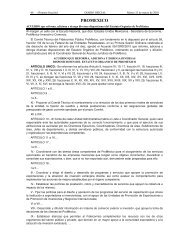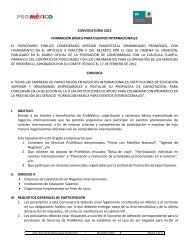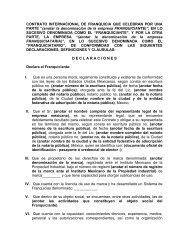ASiAn invASion wElcomEd - ProMéxico
ASiAn invASion wElcomEd - ProMéxico
ASiAn invASion wElcomEd - ProMéxico
You also want an ePaper? Increase the reach of your titles
YUMPU automatically turns print PDFs into web optimized ePapers that Google loves.
eport mexico-japan<br />
2005, this has allowed Mexico to consolidate<br />
itself as a production base for North, Central<br />
and South America, as it did in Europe. This<br />
is thanks to different trade agreements the<br />
country has signed with these regions.<br />
In October 2008, the fourth meeting of<br />
the committee was held. During this reunion,<br />
various topics were discussed including<br />
access of Mexican agricultural products<br />
to Japan; improvement of public security;<br />
immigration procedures; tourism; as well as<br />
other bilateral and trade topics.<br />
Another of the institutions that promotes<br />
bilateral relations is the Mexican Society of<br />
Japanese Studies (Someja), which supports<br />
understanding between both countries and<br />
provides information on related cultural,<br />
educational and trade activities.<br />
There is also the Mexico Japanese Association<br />
(AMJ), which brings together the<br />
Japanese community living in Mexico, as<br />
well as Mexicans interested in learning in<br />
depth about the Nippon culture. Its mission<br />
is to be a symbol of the Japanese community<br />
in the country.<br />
Mexico in Japan<br />
Ministry of External Relations<br />
www.sre.gob.mx<br />
Mexican Embassy in Japan<br />
www.sre.gob.mx/japon<br />
Mexico’s Ministry<br />
of Economy<br />
www.economia.gob.mx<br />
ProMéxico’s Office in Tokyo<br />
(813) 35 80 08 11<br />
cc.japon@promexico.gob.mx<br />
Mexican Society<br />
of Japanese Studies<br />
+ 52 (55) 5536 4024<br />
Mexico Japanese<br />
Cultural Institute<br />
www.icmj.org/instituto.html<br />
Mexico Japanese<br />
Association (AMJ)<br />
www.kaikan.com.mx<br />
EXPORTS FROM<br />
MEXICO TO JAPAN<br />
IN MILLIONS OF DOLLARS<br />
2000<br />
930.54<br />
2001<br />
620.56<br />
2002<br />
1,194.21<br />
2003<br />
1,172.59<br />
2004<br />
1,190.50<br />
2005<br />
1,470.02<br />
2006<br />
1,594.04<br />
2007<br />
1,912.64<br />
2008<br />
2,046.04<br />
2009* 491.88<br />
* January to April SOURCE: BANK OF MEXICO<br />
Finally, the Mexico Japanese Cultural<br />
Institute, a nonprofit community group, supports<br />
cultural exchange and understanding<br />
between both countries.<br />
Bilateral relations<br />
In the last few years, Latin America has<br />
turned into the region with the biggest increase<br />
in exports to Japan. The Asian country<br />
has a free trade agreement with Chile and<br />
maintains important trade relations with Argentina<br />
and Brazil. However, Mexico remains<br />
its main trading partner in the region.<br />
Japan is at the top of the list of Asian countries<br />
that buy Mexican products. In 2008, Mexican exports<br />
to Asia increased to nearly 8.7 billion usd.<br />
Close to 2.1 billion usd of this total were from Japan,<br />
whereas 2 billion usd were received from<br />
China; 1.7 billion usd was the sum from South<br />
Korea, Taiwan, Hong Kong and Singapore; and<br />
1.5 billion usd proceeded from India.<br />
Among Mexican exports to Japan that have<br />
experienced the biggest increase, the main industry<br />
is agricultural products. In 2008, their<br />
exports increased by 21.6% from the previous<br />
year, reaching a total of 757 million usd. Of<br />
these products, meats represent 50% of exports,<br />
making Mexico Japan’s fourth biggest<br />
trade partner in beef and pork products.<br />
Other Mexican products that have increased<br />
their presence in Japan are fruits like<br />
avocado, melons, and bananas.<br />
According to figures from Mexico’s Ministry<br />
of Economy, Japan is the seventh largest<br />
foreign investor in Mexico, with more than<br />
4 billion usd between 1994 and 2008, which<br />
represent around 3% of all FDI in the country<br />
during that period.<br />
Most of Japanese investment in Mexico<br />
can be found in the electronic, automotive,<br />
aeronautic, clean technologies and information<br />
technology industries.<br />
In 2008, nearly a dozen Japanese production<br />
plants connected to the automotive,<br />
electronics and computer sectors, and run<br />
by such companies as Isuzu Motors, Hino<br />
Motors, Toyota, Sumimoto and Casio Computer<br />
Co., were opened in Mexico. n

















